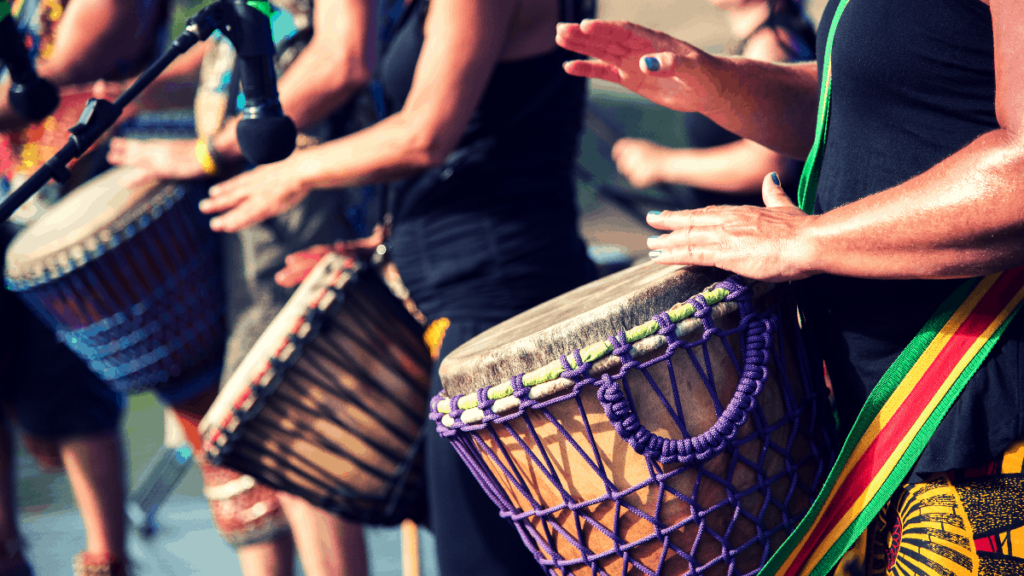First, African music is a tapestry woven with different genres of music from different countries across the African continent. Importantly, It reflects the culture of Africa, a mirror of her societal occurrences, and an expression of her lifestyle. Also, It is a beacon of unity that reflects societal values.
Hence, this article embarks on a journey through the melodies of rhythms of African music, unveiling its inherent connection to the African identity, heritage preservation, and cross-cultural understanding.
Historical Echoes: The Roots of Identity
Originally, African music has its roots in her history intertwining with rituals, ceremonies, and oral traditions. In addition, It reflects the history of Africa and her roots of Identity. Egyptian musicians were the first to record African music in the 3rd millennium BC.
Also, The Egyptians used a wide variety of musical instruments pertinent to that era. Likewise, In North Africa, Islam highly influenced African traditional music.
As time went on, different genres of music with the invention of musical instruments, emanated from different countries of different tribes in Africa.
Diverse Roots; Diverse Identity.
Further, Venturing into its diverse landscape reveals a rich tapestry of genres, each carrying her own identity narrative.
Meanwhile, Some genres of African Music and their countries of origin are:
Apala from the Muslim Yoruba people of Nigeria, West Africa.
Assiko from Cameroon,
Benga from Kenya,
Bongo- Flava music from Tanzania,
Benga from Kenya,
Cabo-love from Cape Verde,
Chimurenga from Zimbabwe,
Coladeira from Cape Verde,
Coupé- Decalé from Ivory Coast and France,
Desert blues from Sahara Desert,
Fuji from Nigeria,
Funana from Cape Verde,
Gbema from Liberia,
High Life from Ghana and all English speaking countries in West Africa,
Hipco from Liberia,
Hiplife from Ghana,
Isicathamiya from South Africa Zulu,
Kimzoba from Angola and North Africa,
Kwaito from South Africa,
kwassa kwassa from Congo,
Makossa from Cameroon,
Maringa from Sierra Leone,
Mapouka from Ivory Coast,
Mbalax from Senegal,
Semba from Angola,
Soukous from Congo,
Palm Wine Music from Liberia,
Taarab from Kenya/Tanzania,
Tcha Tcho from Congolese,
Trapco from Liberia etc.
These are some of the popular genres of music in Africa.
Lyrics as Mirrors of the Society and Cultural Identity
On the other hand, Peering into the lyrics of African songs unveils a world of themes that echo identity narratives and reflect society. From songs lamenting historical injustices to anthems celebrating cultural heritage. Similarly, these lyrical expressions reveal the heartbeats of communities. Likewise, lyrics reflect society and bridge generations. Further, It reminds listeners of their roots, igniting conversations about societal challenges as well as nurturing a sense of belonging. Every verse is likewise a testament to the intricate relationship between music and identity.

The Evolution of African Music Identity.
In the same vein, As the world evolves so does African music. Contemporary musicians have mixed both tradition and innovation, birthing a musical identity that reflects the complexities of the present. Thus, the fusion of traditional rhythms with modern instruments and influences creates a harmonious blend that resonates with global audiences. On the other hand,, Through collaboration and experimentation, African musicians transcend borders in creating innovative music and expressing their cultural identity.
Diaspora Melodic Connection
Because they dispersed the African diaspora across the globe, and as a result, music remains a powerful tool in maintaining a connection to the roots. Also, through vibrant celebrations or poignant melodies, diaspora communities infuse their new environments with echoes of their motherland. Further, This musical bridge helps navigate the challenges of identity negotiation allowing individuals to carry their heritage while embracing the new culture they encounter.

Conclusion
To sum it up, African music is a symphony of Identity, a chorus that sings of resilience, unity, and cultural pride. Importantly, Through the ages, it has been a mirror of reflecting history, a bridge connecting generations, and a beacon guiding communities. Also, With diverse Genres, poignant lyrics, and modern adaptations, African musicians continue to compose the soundtrack of Identity, inviting the world to join in the heritage celebration, culture, and traditions of Africa.
Above all. African music weaves an unbreakable bond and as we listen, dance, as well as connect with African music, Hence, we honor the melodies that harmonies the essence of a continent and the spirit of its people.









